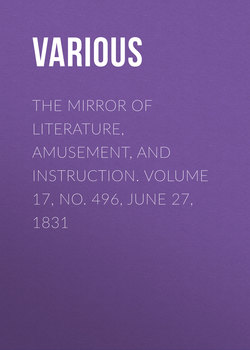The Mirror Of Literature, Amusement, And Instruction. Volume 17, No. 496, June 27, 1831

Реклама. ООО «ЛитРес», ИНН: 7719571260.
Отрывок из книги
The illustrious subject of this Memoir is the eldest son of a gentleman of small fortune, but ancient family, in Cumberland,1 His mother was the daughter of a Scotch clergyman; in the mansion of whose widow, on the Castle Hill of Edinburgh, the father of Lord Brougham lodged when prosecuting his studies at the University there. Chambers, the laborious topographical historian of the Modern Athens, says that Lord Brougham was born in St. Andrew's Square, in that city, though this has been disputed. The family of the late Mr. Brougham consisted of four sons:—Henry John, an extensive wine-merchant in Edinburgh, who died at Boulogne, about two years since; James, the Chancery Barrister, who formerly sat with Baron Abercromby in parliament, for Tregony, and sits at present for Downton, Wilts; and William, who has recently been appointed a Master in Chancery, and elected Member for the Borough of Southwark.
In early life Mr. Brougham was called to the bar of the Supreme Court of Edinburgh, where he practised for some time, and with considerable success, if we may judge from his frequent employment in Scotch appeals. His selection, too, on the part of persons charged with political offences to conduct their defence, would imply him to be well read in the institutions of his country. It was while at the Scotch Bar that, in conjunction with the late Mr. Francis Homer and Mr. Jeffrey, he planned and established the Edinburgh Review, of which he was for many years a most able and constant supporter. About this time also he became a member of the celebrated Debating Society at Edinburgh.
.....
The Queen having arrived at St. Omer, on her way to England, Lord Hutchinson, on the part of the King, was despatched to prevent, by a liberal offer, her leaving the continent. Mr. Brougham consented to accompany his lordship, willing to co-operate in the purpose yet bound by office and by friendship to secure for the queen the best possible terms. The Queen, however, was resolved, and while the deputies were exchanging notes, her Majesty sailed for England, and proceeded to London amidst all the demonstrations of popular triumph. Mr. Brougham, with Mr. Denman, on behalf of the Queen, next met the Duke of Wellington and Lord Castlereagh, on behalf of the King, to propose measures for an amicable arrangement, but the insertion of her Majesty's name in the Liturgy being refused, the negotiation failed. The struggle was now fast approaching. The notable green bag was laid on the table of the House of Commons, and Mr. Brougham commenced by deprecating a hasty discussion. The next day the minister developed the projected prosecutions of the government; Mr. Brougham replied, and concluded by demanding for the Queen a speedy and open trial. We need only advert to his subsequent reply to the note of Lord Liverpool, to the speech of Mr. Canning, and to the conciliatory proposition of Mr. Wilberforce. Then followed his speech at the bar of the House of Lords against the intended mode of investigation—his speech against the bill of Pains and Penalties—his reply to the crown counsel, and afterwards to the Lord Chancellor—and finally his defence of the Queen against the several charges. His defence, it will be remembered, lasted nearly two days, and Mr. Brougham, amidst profound silence, concluded one of the most eloquent speeches ever heard within the walls of parliament—with this pathetic appeal:—
"My lords, I call upon you to pause. You stand on the brink of a precipice. You may go on in your precipitate career—you may pronounce against your Queen, but it will be the last judgment you ever will pronounce. Her persecutors will fail in their objects, and the ruin with which they seek to cover the Queen, will return to overwhelm themselves. Rescue the country; save the people, of whom you are the ornaments; but severed from whom, you can no more live than the blossom that is severed from the root and tree on which it grows. Save the country, that you may continue to adorn it—save the crown, which is threatened with irreparable injury—save the aristocracy, which is surrounded with danger—save the altar, which is no longer safe when its kindred throne is shaken. You see that when the church and the throne would allow of no church solemnity in behalf of the Queen, the heartfelt prayers of the people rose to heaven for her protection. I pray heaven for her; and I here pour forth my fervent supplications at the throne of mercy, that mercies may descend on the people of this country richer than their rulers have deserved; and that your hearts may be turned to justice."
.....